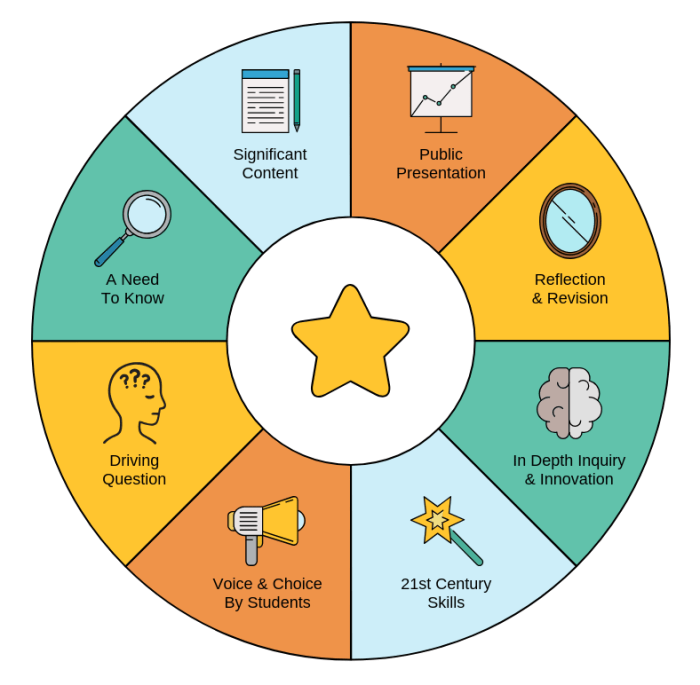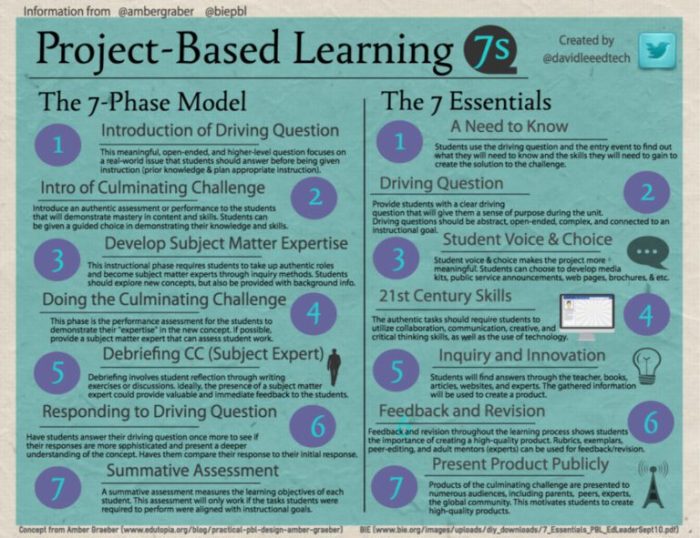With Benefits of project-based learning in schools at the forefront, this article delves into the transformative power of project-based learning, showcasing how it nurtures critical thinking, enhances collaboration, and boosts student motivation. Get ready to explore the dynamic world of hands-on education!
Project-based learning goes beyond traditional classroom methods, offering students practical skills, increased engagement, and a deeper understanding of concepts. Let’s uncover the numerous advantages that this innovative approach brings to the educational landscape.
Benefits of project-based learning in schools

Project-based learning is a teaching method that offers numerous benefits to students by fostering critical thinking skills, problem-solving abilities, collaboration, and communication skills. Let’s delve into how project-based learning enhances these important skills in students.
Developing Critical Thinking Skills
Project-based learning encourages students to think critically by presenting them with real-world problems or challenges to solve. By engaging in hands-on projects, students are required to analyze information, evaluate different solutions, and make informed decisions. This process helps students develop the ability to think critically and approach problems from multiple perspectives.
Obtain a comprehensive document about the application of Effective study techniques for exams that is effective.
Real-life Applications of Problem-Solving Abilities
One of the key advantages of project-based learning is its emphasis on developing problem-solving skills in students. For example, in a science project where students are tasked with designing an experiment to test a hypothesis, they must apply their knowledge, creativity, and critical thinking skills to overcome obstacles and find solutions. This hands-on approach not only enhances their problem-solving abilities but also prepares them for real-life challenges they may encounter in the future.
Promoting Collaboration and Communication Skills
Project-based learning promotes collaboration among students as they work together to achieve a common goal. By collaborating with their peers, students learn how to communicate effectively, share ideas, and listen to different perspectives. These experiences help students develop strong communication skills, learn how to work in teams, and appreciate the value of cooperation in achieving success.
Impact on student engagement and motivation
Project-based learning has a significant impact on student engagement and motivation in schools. By making learning more interactive and hands-on, project-based learning captures students’ interest and keeps them actively involved in the learning process.
Increased Student Engagement
- Project-based learning encourages active participation from students as they work on real-life projects and tasks.
- Students are more engaged when they have the opportunity to apply their knowledge and skills to solve practical problems.
- Collaboration with peers on projects fosters a sense of community and teamwork, further enhancing student engagement.
Boosted Student Motivation, Benefits of project-based learning in schools
- Project-based learning allows students to explore topics they are passionate about, making learning more personalized and meaningful to them.
- When students are given the freedom to choose project topics, they are more motivated to delve deeper into the subject matter.
- Having a sense of ownership over their learning journey motivates students to take initiative and pursue self-directed learning.
Development of practical skills

Project-based learning plays a crucial role in helping students develop practical skills that are essential for success in the workforce. By engaging in hands-on projects, students have the opportunity to enhance their time management, organization, and research skills, among others.
Time Management
- Through project-based learning, students are required to set deadlines, prioritize tasks, and allocate time effectively to complete their projects on time.
- These time management skills are directly transferable to real-world scenarios where meeting deadlines is crucial for success.
Organization
- Students participating in project-based learning develop organizational skills by planning, structuring, and coordinating various aspects of their projects.
- Organizational skills learned through projects can help students in managing complex tasks and projects in their future careers.
Research Skills
- Project-based learning requires students to conduct research to gather information, analyze data, and draw conclusions to complete their projects.
- These research skills are invaluable in the workforce, where the ability to gather and evaluate information is essential for making informed decisions.
Importance of Hands-On Projects
- Hands-on projects provide students with practical experience and the opportunity to apply theoretical knowledge in real-world contexts.
- By engaging in hands-on projects, students gain valuable experience that prepares them for the challenges and opportunities they will encounter in their future careers.
Enhancing retention and application of knowledge: Benefits Of Project-based Learning In Schools

Project-based learning not only enhances student engagement and practical skills but also significantly improves retention and application of knowledge. By allowing students to apply concepts in a real-world context, project-based learning ensures that information is not just memorized temporarily for exams but truly understood and retained for the long term.
Improved retention through practical application
- When students work on projects that require them to apply their knowledge to solve real-world problems, they are more likely to remember and understand the concepts involved.
- By actively engaging with the material in a hands-on manner, students form stronger connections in their brains, leading to better retention compared to passive learning methods.
Examples of effective knowledge retention
- In a project where students create a business plan for a startup, they not only learn about entrepreneurship concepts but also retain this knowledge because they see its relevance and application in the project.
- Building a model solar system not only teaches students about planetary orbits and distances but also ensures that this information sticks because they have physically constructed and interacted with it.
Long-term benefits beyond the classroom
- Students who engage in project-based learning are more likely to remember and apply what they have learned even after the project is completed, as the experience is more memorable and impactful.
- By focusing on practical application and real-world scenarios, project-based learning prepares students for future challenges and tasks that require them to draw upon their retained knowledge and skills.